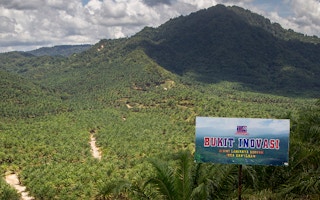Malaysian state-owned plantation company TDM Berhad has been accused by a green group of accepting forest-covered land from the provincial government, with the alleged intent to clear it to develop oil palm plantations.
To continue reading, subscribe to Eco‑Business.
There's something for everyone. We offer a range of subscription plans.
- Access our stories and receive our Insights Weekly newsletter with the free EB Member plan.
- Unlock unlimited access to our content and archive with EB Circle.
- Publish your content with EB Premium.
In a press statement, the Malaysian arm of World Wide Fund for Nature (WWF) said TDM acquired 4,515 hectares of forest reserve land offered by the Terengganu state government earlier this month.
The state government has switched the status of the land from forest reserve to government land, and to compensate will award other forested areas with reserve status, according to local media reports.
The deal—which WWF has said will amount to “large-scale deforestation”—will also see TDM pay RM250 (US$63) per hectare per year to a trust fund for wildlife conservation and conflict management.
“WWF-Malaysia strongly opposes this conversion of forest reserve land, as the conversion of primary or secondary forests to oil palm plantations, which is tantamount to large-scale deforestation, leads to significant loss of biodiversity, multiple direct and indirect socioeconomic impacts, and disruption of delicate ecosystems,” a WWF statement read.
It added that the removal of legal restrictions in protected areas has led to many occurrences of unnecessary deaths of iconic and endangered species such as elephants and tigers in 2017 alone.
“
Non-compliance with RSPO principles and criteria, if not rectified, can result in termination of TDM Berhad’s RSPO membership.
Stefano Savi, global outreach and engagement director, RSPO
As a member of the Roundtable on Sustainable Palm Oil (RSPO)— an industry association that promotes the use of sustainable oil palm products through certification— a plan to develop more plantations by TDM will contradict one of RSPO’s main missions: to minimise deforestation.
The RSPO is already undergoing an investigation to ensure that the company continues to comply with its principles and criteria.
Membership principles include not clearing any primary forest and High Conservation Value (HCV) land and for any new planting or development to comply with RSPO’s New Planting Procedure (NPP). This ensures that new oil palm plantings will not negatively impact forests and biological diversity in the surrounding areas.
“Non-compliance with RSPO principles and criteria, if not rectified, can result in termination of TDM Berhad’s RSPO membership,” commented Stefano Savi, RSPO global outreach and engagement director.
In a meeting with RSPO officials that took place in Terengganu last week, TDM Berhad assured the industry group that the company is committed to RSPO standards and practices.
Savi told Eco-Business that TDM informed them that it had not received any land title from the state government and acknowledged that prior to any new development, they will comply to RSPO’s new planting procedures.
On its website, TDM Bhd has announced a rise in share price after obtaining a land grant for “domestic plantation expansion”.
The Terengganu state government had not responded to Eco-Business’s requests for comment at the time of publishing.










